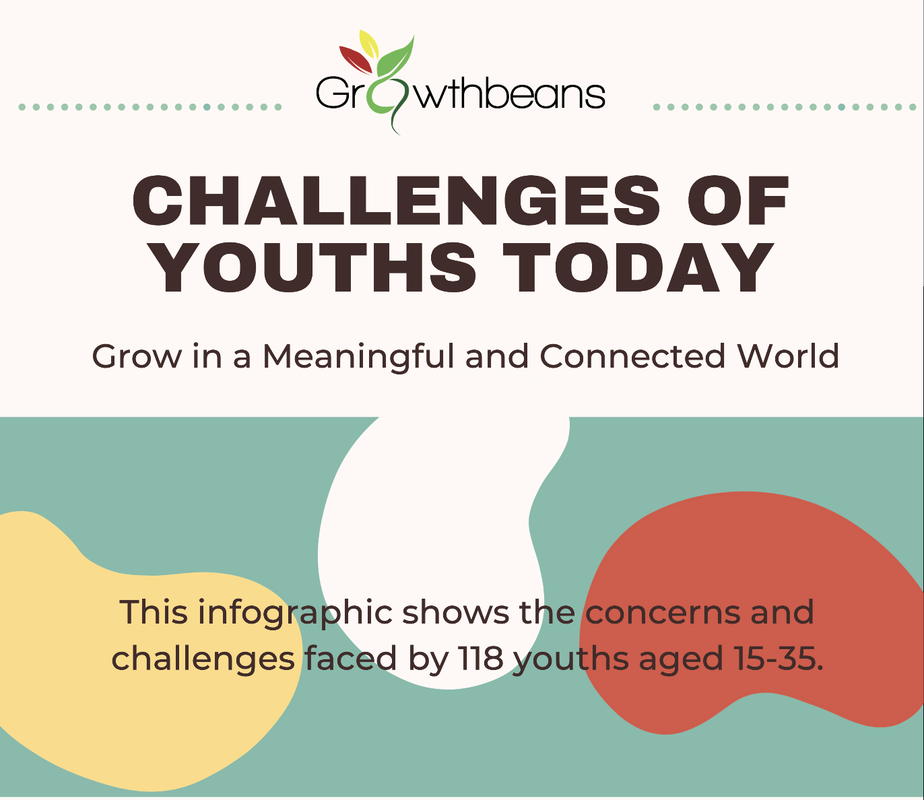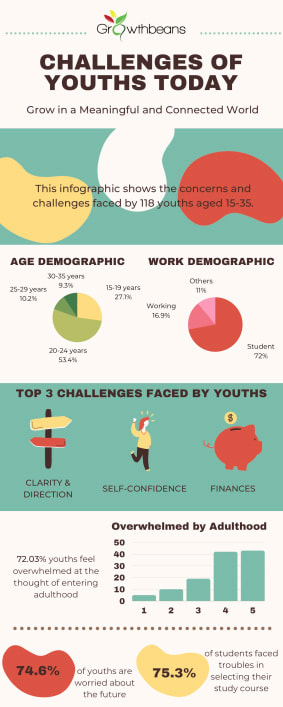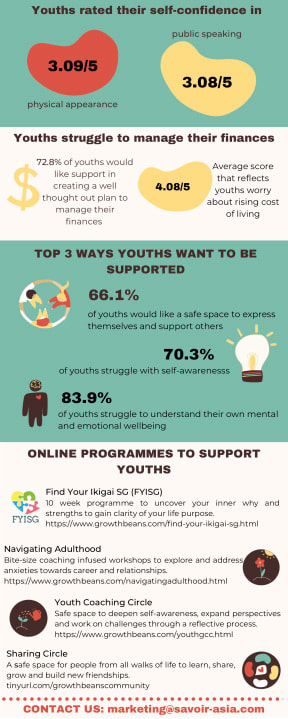|
Growthbeans supports Deputy Prime Minister Lawrence Wong regarding the need for a “new social compact” and revisiting the definition of success apart from our traditional focus on academic achievements and meritocracy [1].
Every one of us is driven to succeed in life; this includes various aspects such as accumulating wealth, attaining lofty job titles and owning private property as a tangible measure of success. The term to describe this endless and competitive struggle is termed the rat race, which was first coined in the 1930s [2]. In view of these stressors, it is important to take a step back and revisit our understanding of what success means to us as an individual apart from what society dictates. So, this begs the philosophical question, what is the definition of success? If success is not benchmarked against external markers, then there is a need to have an alignment of what we value, what we are passionate about, and articulating our purpose in view of what society prescribes. Letting go of the fear of failing and the judgement that we receive from society is crucial to have a deeper understanding of what success means to us personally. Psychologists interviewed by Today [3] agree that there is a pervasive fear of failure in Singapore society in achieving excellent results among Singaporean students. Instead of running away from failure, we need to recognise that we are human after all and embrace failure as part of life and view it as a learning opportunity to enable us to craft our own definition of success. Having run Find Your Ikigai SG workshops for more than 300 students youths from ITE, polytechnics, universities and young working adults. We have found that everyone has different needs and wants in how they view success. ITE students often have an idea of what success could look like for them but have limiting beliefs due to strong societal messaging and expectations and the fear of disappointment while University students struggle with parental expectations versus pursuing their passion. The challenges that young working adults face range from managing toxic workplaces, being unclear of what they seek, misalignment in personal values and work values, lack of work-life balance, lack of relationships, support, and time management, etc. Growthbeans have come across two participants; a student and a HR professional, both expressing that they were happy with where they are but were led to feeling unhappy and discontented because of peers or family telling them that they should be doing other things or to be more. To help one another aspire to be more is a good intent, but it requires moderation to allow us the space to find ourselves and choose how we want to define and lead our own lives on our own terms of success. Another example Growthbeans has come across was in a recent conversation with a student on how he would define success for himself. The student was unable to because it wasn't about any specific outcome. For the student, what is important is the ability to explore. This brings to light another important consideration for us - is success an outcome or a process? We believe it is up to each individual to determine that for themselves. As a society, we need to be able to embrace both and not just define success as outcomes otherwise the fear of failure will always prevail just because we have forgotten to celebrate the progress, learnings, and milestones along the way. For us to redefine success, we need to support one another by giving each other space to reflect and discover, expand our perspectives on success, and not be compelled and hard-pressed to follow the herd or push others to follow the herd. Success can be obtained via less-trodden routes, and we can all embrace different definitions of success. So let us take this opportunity to reflect on what success means to you and share with us your thoughts on how you would define your version of success. Citation [1] https://www.channelnewsasia.com/singapore/new-social-compact-key-shifts-education-meritocracy-seniors-lawrence-wong-3422931 [2] https://www.etymonline.com/word/rat-race#etymonline_v_36916 [3] https://www.todayonline.com/singapore/brilliant-minds-anxious-souls-top-students-discuss-their-fear-failure-demons-after-pisa
0 Comments
Growthbeans have conducted a survey by asking 170 youths aged 17-35 through our coaching and mindfulness-infused program (Find Your Ikigai SG Program - FYISG) to discover their dreams for the future. We found out that the top 5 dreams are:
It is interesting to note that wealth, popularity and material possessions were not considered by the youths in our survey. Instead, the data seems to suggest that there is a need to be heard and understood when we consider the top three results: empathy, good health & well-being and more compassionate & psychologically safe spaces. Download the infograph below to read more on how COVID-19 has unveiled a deeper need for mental health support and how to remain resilient! What are your dreams? Share with us in the comments below!
Caregiver and feeling burnout?
We live in a culture with long work hours and this has only been accentuated by Covid-19. On top of work (if they are working), caregivers also expend physical, mental and emotional energy to support loved ones and provide them with companionship. In this way, it’s no surprise that many caregivers eventually find themselves burnt out. As caregivers, self care is important. While providing care and attention to others, let us provide you with the care you need for yourself so that you can continue to provide for others. To do this, Growthbeans is partnering with SG Assist to offer a 50% discount* to all caregivers 35 years and below in our Finding Your Ikigai SG Program. This program helps you to understand your needs and reconcile your inner strengths to empower you to be resilient in these tough times. Click here for the link: https://hi.switchy.io/5Kyf *Please note the following:
Summary: This article reflects my life when I was retrenched in 2016. I struggled to find meaning until I was fortunate enough to find a coach that helped me identify my values holistically. Discovering my values is like using gold to mend the pieces of broken pottery. If you are in a hurry, here are the key pointers.
1. Identify your values. Your values are the foundation on which you build your life on. It gives meaning to what you do. 2. Engage coaches who can help you consider your life goals from a wholistic perspective–what you value, what you are good at, what you can give back to the community and what you can earn a salary from. 3. Be patient with yourself. The journey in discovering what works for you is not found within a day. Give yourself time to reflect and build upon those reflections to create a solid foundation. Rebuilding my life post retrenchment is like mending broken pottery with gold. It is like the Japanese art called “Kintsugi”–“Kin” meaning gold and “tsugi” meaning to join. “Kintsugi” means golden joinery, where powdered gold is used to repair the cracks and is used to hold together broken pieces of pottery. This reflection is my story of finding meaning in life, and I hope you enjoy reading this. In 2016, when the oil prices plummeted, many projects were at a standstill. As a result, I could remember seeing employees spend more time gossiping at the pantry on how the future is going to be like. Nobody dared to utter the word “Retrenchment” for fear it will be a self-fulfilling prophecy. Intuitively I knew it was only a matter of time that I will be retrenched. Within the next few days, my manager called me up for a conversation. The HR manager present with my manager meant it was an exit interview. As I braced myself to face the bad news, I was certain I was not listening to anything that she was saying. The only thing I could remember was a name card to contact a career counsellor who is experienced in handling retrenchments. By the end of the day, I shredded confidential documents, emptied my cupboard, and took the cab home. Being at home over the next few months took a toll on my mental health. Unresolved guilt in failing to be a breadwinner led me to develop Major Depressive Disorder. During this period of depression, I could not perform simple tasks such as getting out of bed. I knew I needed to get a job, however; I found that rewriting my CV was daunting as you have to be specific in writing certain keywords to be detected by the algorithm used by HR. I felt tired tailoring my CV to suit the job description that I applied for that I gave up altogether. I was certain that I wanted meaning and purpose in my career and I began a google search the two keywords “meaning” and “career”. At face value these two ideas seem to be mutually exclusive. It suggested that you can have any job but it will not guarantee you any satisfaction. The only benefit of a job is a salary and nothing more. I looked through philosophical articles concerning the purpose of existing. I read the works of Soren Kierkegaard and Albert Camus and found myself more depressed in the lack of direction until I came across the concept of finding your Ikigai. “Ikigai” in Japanese means reason for being and it is the intersection of what you’re good at, what you can be paid for, what you love and what the world needs. My previous career lacked a purpose, and I felt empty most of the time. I addressed the feeling of emptiness when I was going through the question, “What will my regret be if I were to die today?”. The answer to that regret was the inability to leave a legacy and to be remembered as someone who advocate for others. Finding that answer was key in addressing the emptiness I had with my previous career. Who knew that a simple question on regrets on your deathbed holds the missing piece in my search for meaning. These values that I hold dear proved to be the gold that joins the broken pottery of my life together. Right now, I am in a better place where I am a writer with a social enterprise. I find great joy in crafting content that has a mission. I hoped this life experience of mine will help you. Take care. Guest writer for Growthbeans, J.Wong Resources that may help you find meaning in your career • https://www.16personalities.com/free-personality-test • https://www.growthbeans.com/find-your-ikigai-sg.html • https://content.mycareersfuture.gov.sg/careercoaching/article/find-a-career-you-love-using-riasec/s "I saw a black jaded crow & a community that looks out for one another" were the symbols and what Dexter visualized in one of our "Find your Ikigai SG" sessions with his coach. And since then, emotions were sparked to commit to kickstarting Hawkerthon, a hackathon to help marginalized hawkers being affected by the Covid-19 pandemic using innovative solutions.
COVID-19 has radically changed the way how we dine in Singapore. The no dine-in rule for Phase 2 (Heightened Alert) meant that we could only have to take away when we either order in person or ordering online. While the latter measure seems to be a convenient option for those who are familiar with the use of applications such as Grab or Food Panda; elderly hawkers who are not well versed in using technology to keep up with the demand for online orders seem to be left behind. The only source of sales for these elderly hawkers would be from regular foot traffic during lunch or dinner time, word of mouth or customers who are intentional in making their purchase from the hawkers. As a result, many of these hawkers are bleeding financially and they are reliant on their savings to keep themselves in business or risk winding up if poor sales performance continues. Dexter Goh is sympathetic towards the problems these elderly hawkers are facing and is currently promoting a hackathon for hawkers - a “Hawkerthon”. The initiative of the hackathon is to find innovative solutions to assist hawkers in using technology to conduct their business and not fall off the technological grid. Dexter credits that the “Hawkerthon” initiative was born out of the vision that he had when he was discovering his purpose through the Find Your Ikigai SG program. Dexter seeks to build a community that looks out for one another and in this case is to care for the elderly hawkers. To learn more about Hawkerthon you can find this on Instagram https://www.instagram.com/hawkerthon/, or you can sign up at this link bit.ly/Hawkerthon2021 To learn more about Find Your Ikigai SG you can find it in this link https://www.growthbeans.com/find-your-ikigai-sg.html We understand that most Universities in Singapore have released matriculation results. For those satisfied with the outcome, we would like to congratulate you. For those who are currently feeling despondent and discouraged about what the future would be like, please read on. “Big man in a suit of armor. Take that off. What are you?” –Captain America. “Genius, billionaire, playboy, philanthropist.” –Iron Man. Taken from: https://imsdb.com/scripts/Avengers,-The-(2012).html If we looked deeper in this candid exchange between Iron Man and Captain America, we could see that the idea of self worth is intricately interwoven with what we take pride in. With Iron Man, that would be his technology and armor and for your case it is the acceptance letter that you are hoping to receive in your mailbox. I could imagine the immense disappointment you are facing right now. I have been in a similar situation where I have aced my multiple mini interviews only to receive a rejection letter after a three month wait. For those who have applied to any faculty, I am well aware of the efforts undertaken to maintain your grade point average, to prepare for interviews, to cross your i’s and dot your t’s. To present the best version of yourself to embark on the next phase of your career, only to be greeted with disappointment. So, who are you when this acceptance letter is taken away from you? With Iron Man, it was not the intellect, the wealth, the possessions, but the self-sacrificial attitude that he had. If you study the context of The Avengers, Iron Man showed the self-sacrificial attitude that Captain America initially accused him to be lacking of. Amid this distress you are facing, can I draw a parallel in your current circumstance where, despite not having an acceptance letter, you choose to move forward with resilience and grit to forge a fresh path for yourself? Do not be hasty to conclude that your chapter is over. Do not let one instance of perceived failure define your future. You are at the starting point in rewriting your narrative. We often forget important life survival skills when facing a crisis. We panic when a trial hits us. Go offline from social media for a while to reflect. Identify what you value, what are your skills, your strengths and see how things add together. Reach out and have a conversation with your parents, your best friend, your mentors and your coaches on what they think. If you still feel that you have a fighting chance, submit that appeal letter. The greatest act of defiance in the face of an impossible situation is to face your challenge and move on. You are not alone in dealing with this. p.s. Reach out to us @growthbeans if this message resonates with you. p.p.s Growthbeans provide individuals and leaders with a safe space to connect with your inner self, strengthen soft skills and enhance well-being. Find out more on our programs at https://www.growthbeans.com/programmes.html AuthorJason Hershel Wong, Guest writer for Growthbeans. Growing up, we would think about the future and wonder how our lifestyle and career would look, only to feel fear and anxiety creeping up on us. With the uncertain times we live in today, it is only natural that we worry each day about whether we can find a job, much less make a living to afford the lifestyle we want. We have lofty dreams for ourselves and yet we face trying times. Fears about adulthood, our career path, money management and all these anxieties lead to us battling day in and day out with our self-confidence. If you are a youth reading this, know that you are not alone in your battles and there are many youths out there who face the same challenges as you. We know this as fellow youths ourselves, and also based on the insights illuminated by our market research conducted in June 2020. As the challenges faced by youths have always been something that is a key concern to us at Growthbeans, we surveyed 118 youths in Singapore, ranging from 15-35 years old in order to understand some of the current challenges they face and the support that they seek. Here are our insights towards the challenges faced by youths today. #1 75% of Youths are uncertain about the future Looking at today’s situation, we have all been hit hard by the COVID-19 pandemic and the economic downturn. We wake up to news either about rise in cases around the world or about a new wave of retrenchment. Amidst the Covid-19 backdrop which has fast-tracked changes on many different levels, youths fear they might not be able to adapt to this challenge. School going youths continue to struggle to figure out what courses to take. Graduating youths worry about potential career options and not being able to find a job for themselves, while fearing their current skill-sets will become obsolete. Working youths might worry about job security. #2 Youths struggle with self-confidence The two key areas in which youths struggle with regards to their confidence are their physical appearance (youths rated 3.09/5 in self-confidence) and public speaking (youths rated 3.08/5 in their confidence towards public speaking). Some youths feel self-conscious about their physical appearance and this impedes them from connecting and developing meaningful relationships with others. With the education system focusing more on class presentations and participation, the need to engage in more public speaking puts greater pressure on youths as they fear making mistakes or providing too controversial an opinion in class. #3 73% of Youths are unclear about financial management It is often daunting to think about managing finances. We feel the pressure of a rise in the cost of living, and managing that with our desired lifestyle. Youths wonder how much money to save every month for those rainy days, what to truly invest in and how CPF works. Based on market sentiments, 72% of youths would like to have more support in terms of planning their finances. #4 Top 3 Support that Youths seek Amidst these challenges, the top 3 support that youths seek are a safe space to express their perspectives towards various issues (66.1% of respondents), work on deepening their self-awareness in order to gain more clarity (70.3% of respondents) and understand their mental and emotional well-being (83.9% of respondents). A mentor once shared with us, “when we reflect back on our lives, the greatest growth we have for ourselves doesn’t happen when life is smooth sailing. It always happens when we survive the different challenges.” We recognize that these are challenging times. However, this also means that it is an opportunity for us to develop our resilience together and maximize our growth so that we can sail to greater heights. To all youths out there, you are not alone in your challenges as you transition into adulthood. A key element to building resilience is positive social relationships and we at Growthbeans will like to walk with you throughout this growth journey. We believe in the potential of every single individual and we would love to support you in the best way possible. If you are looking to gain clarity in your purpose and discover more direction in life, the Find Your Ikigai SG (FIYSG) programme might just be the right thing for you. If you are looking for support in transitioning into adulthood, then do check out the Navigating Adulthood series – Navigating Career, Settling in the Workplace, Navigating Relationships & Making Sense of Money. If you are looking for a listening ear or clarity on specific issues, you may check out our Youth Coaching Circle programme. If you feel that any of the above programmes will benefit you but you do not have the means to pay, drop us an email. Click to download the infographic
It was in the last couple of years that I shifted my understanding of what kind of support I needed and how I can give support to others. It was in this period that I realised that the support I gave to my family and friends was not always as impactful as I hoped it to be, but you have to go often first to a dark place to get the right measure right. Many years ago my sibling went through a divorce. All of us were there to support her, and wanted to help her work towards a solution. Then, I was convinced that she had made the wrong decisions and she should do it the way my family, our friends and I had advised her to. She, however, did not act upon our advice and I was left in disbelief, not being able to understand her reaction. It took a life threatening situation that I found myself in years later, to understand her reaction and what giving support really meant. When I was in a dark and vulnerable state, the well-intended and positive words of others felt very distant and could not sink in. Feeling insecure and unsettled, everything seemed a lot harder and everything required a lot more courage, energy and inner power; all of which I felt drained of. Despite the strong support from family and friends, I felt I was still sinking quickly into a dark place. Looking back, I finally understood that the support I was providing for my sibling was not what she needed. I was supporting her from my own perspective of what I thought was right. It was easy for me to say so because I was secure in my safe space. I had not sufficiently understood the space that she was in, her thoughts, fears and concerns; and had not realised that she was not in a position to hear what I was saying as she grappled with her own thoughts and emotions. What I have learnt over time, through personal experiences, coaching and especially from Growthbeans, is that we need to give everyone their own time and space to understand their own situation. We all see things in different perspectives, and the value that someone expects from someone is not always the value that you can give to someone. It’s not always possible to give exactly the right kind of support, as you don’t know the situation completely. But you can give your empathy, your understanding, and your willingness to listen. Tip 1: Create Psychological Safety Make sure the person you support feels safe when you talk to them, and that they are safe or feel safe where they are. Trust in someone is what they need to come out of that dark place. Tip 2: Be Present with Them Every individual going through a rough period would appreciate you being present with them. This can be through just having a walk and a conversation, it can be through a hug, it can be through listening or just through being there. Tip 3: Understand their Preferences I have learnt through the years of living in many different countries that when I understand the person better I can give better support. This includes understanding their way of living, what their values are and what is the best way for us to communicate. Some people get energy from people and need to see people to feel supported, others would like to be left alone to understand their emotions first. So, take some time to provide support according to their preferences, and not your personal preference. Having said that, there are many ways to give support to others. Here are some ways in which I give support to my family and friends whom I have come to understand.
Now, how about you? How have you been giving support? How has that been working for you? AuthorMarc Lansu is an ICF accredited coach of Growthbeans. He co-founded two social enterprises previously and focuses on Executive, Startup and Team coaching. You have read about people who seem to have boundless energy accomplishing 101 things in their day, and you wonder, how do they do it? How do they get so productive? You begin your research to find some of these best practice tips and make a plan to execute them. The first of many tips is to wake up at 5am for a morning exercise. The idea is to start the day with more energy to fuel us in the productive day ahead. Eager to be more productive, you try that only to find yourself less focused and struggling to keep awake in the afternoon. Then, maybe you try to create a plan for yourself to follow except that everything never goes as planned. Why doesn’t it work? It turns out that a productive day for each of us might be very different from others. We all need something personalised for ourselves. After all, all of us do have days where we were productive by our own standards. What is it then that makes a productive day different from any other days? Let us create the top 5 tips that would work for us. Step 1: Define Productive First and foremost, let us take time to understand what productive means to us. Recall times/days when you felt like you were productive. Ask yourself these questions:
When I was in a previous company, being productive to me included being able to clear as many emails as possible. When I came out to be on my own, my day was mainly spent meeting different people. Meeting different people back then was not considered as real work to me and I felt it was an unproductive day. It took some self awareness and introspection to recalibrate my definition of productivity and anchor myself. Step 2: Identify Energy Peaks Have you ever paused to reflect on when you tend to be most energetic and focused? It is that time of the day when you work best and feel like you are ready for anything. That time of the day differs for everyone of us. Notice your energy levels in a day (perhaps over the next few days).
While some people’s peak might be in the night, the time when I work best is in the morning. It is also worth noting that there could be other possible contributors to energy peaks and these could include things like:
For all the occasions that you felt you were productive (based on your personal definition), take a moment to list out what those days looked like. Ask yourself these questions:
For example, when I reflect on the days where I was productive, the common factors that emerged are:
Are you able to identify the common factors for yourself? Step 4: Determine Derailers There are bound to be things that are not within our control and that will deter our productivity. What could some of these de-railers be? Note that derailers could be internal or external factors; i.e. driven by you or others. Ask yourself:
For example, I tend to have many ideas that gets me really excited throughout the day. However they can also be derailers as it may distract me from my existing task. While I cannot control the many ideas that pops up in my head, the way I have chosen to manage them is to write them down in my ideas book for me to refer to later. The key is to come up with strategies you can tap on that will help you to manage derailers so that they do not end up affecting your productivity. Step 5: Replicate what you can control Knowing the common factors that can contribute to your productivity, which of these are within your control that you can replicate on a daily basis? Take a moment to visualize them happening in your daily life. Convert them into daily habits and make it part of your schedule. Then, think about the potential derailers that could happen and the accompanying strategy that you will use to deal with it. Visualise the process of you managing the derailers successfully, from the thoughts you have, to the feelings and the action. Imagine what it feels like to have managed the derailer to remain focused. Example
The next step is to put your plan into action and observe changes in your productivity level. Note that this is not a one off exercise. Continue to observe yourself on a regular basis and notice if there are any new energy peak creators, any new factors that contribute to your increased productivity or any new de-railers that are entering the picture. Repeat steps 1-5 until you find a strategy that is best tailored to suit you. If you are stuck, try out some of the best practices for a period of time while going through steps 1-5. Good luck! Do feel free to reach out if you need any support! AuthorShane Yan is cofounder and an ICF certified coach and trainer of Growthbeans. She is an author of Wide Asleep Sound Awake – a self-awareness activity book that unleashes the potential of individuals, She is also Mental Toughness (MTQ-48) and Emergenetics Certified, and a Reiki Practitioner. There are many different stressors at a work place and that includes managing people and politics, building relationships, learning on the job, solving difficult problems, dealing with mistakes and even fire-fighting. These stressors, on top of managing our family and life, are sufficient to overwhelm anyone. Another stressor that we may not be aware of, because we have grown to be so dependent on it, is technology. Technological advances create possibilities that not only can change the nature of work, but also influence human behaviour. We have only just scrapped the surface of technology’s capability and we can only imagine the wave of innovations and change that it will continue to bring. With changes in the economy and advancement in technology, companies are experiencing changes in the business climate and how things are done at a much faster rate. In response, companies need to constantly innovate, embrace technology, overcome new and different challenges to keep up and stay ahead of the market. The demands on us are escalating! Naturally, these trends and changes will impact all of us who will now need to juggle existing work stress and the additional impetus to maintain skills relevancy. Above all, we have to be able to thrive in an environment of uncertainty and stress, continuously upgrade our skills, keep up with the pace and intensity of work, keep our emotions in check and to keep pushing ahead in spite of adversities. With all that is going on, who is to say that mental resilience should not be our key focus? What is Mental Resilience? Mental resilience is an attitude and mind-set that drives us to look at adversity in the face, and never bow to challenges in defeat. It is a certain toughness and persistence that enables us to keep positive and persevere amidst change, uncertainty, difficulties, mistakes, and failure. The quote by Lou Holtz “Virtually nothing is impossible in this world if you just put your mind to it and maintain a positive attitude” sums it up. There is no greater obstacle to overcome other than ourselves and our mind. After all, how we think relates to our choices and actions which influences the outcome. Some signs of a lack of mental resilience include giving up on the tasks without having tried, an unwillingness or avoidance to take up responsibility or be responsible for our own actions, a lack of self-confidence and a fear of challenges and failure. This could also include resistance to change, breaking down easily, blaming others for obstacles we encounter, and being unwilling to change our thinking or be open to new ideas. What Can We Do to Enhance Resilience 1. Be aware of stress levels and manage it. Prolonged stress can create blind spots in the way we think and limit our perspectives, and it can alter our behaviour. When we are distracted, tired or pressed for time, that when our biases kick in and we may react in least optimal ways. Hence, recognise stress symptoms early and do something to arrest it. Be self-aware, and aware of any negative thoughts and cast it aside. It does not serve you at this point. 2. Draw strength from past successes It is probably not the first time you are facing a difficult situation. Take a moment to reflect on how you have handled and overcome similar or difficult situations in the past. You managed it before, you can manage it again. Draw strength from history and it will provide you with the lessons and advice to carry on. 3. Visualise success When faced with an obstacle, it is okay to acknowledge that we do not have an answer or know-how to approach it yet. However, surely we have a better idea of what our ideal outcome is. Start by visualizing success and believing that any challenges can be overcome. It will provide more clarity for you 4. Breakdown the challenge Break the complex task into simpler ones so that it no longer remains an overwhelming and debilitating obstacle. It will also give you a sense of greater control and progress as you tackle each bite sized pieces one at a time. 5. Expand your perspective Be willing and have the courage to seek out advice, perspectives or help from others. Talk with others, find mentors or coaches. They can help reframe your thoughts and gain insight on how you have been approaching it. Perhaps you have gotten it all wrong right from the start. Time to reframe the issue! 6. Never give up trying Being spoon-fed and waiting for answers to appear will do you no good. Keep trying and learning. Take everything as an opportunity to learn and be stronger and better. Focus on the things you can do. 7. Be Patient Know that Rome wasn’t built in a day. Everything takes time and sometimes, failure is part of the process. Pick yourself up, learn from mistakes and keep on moving but stay focused. Learn to unlearn and relearn. Just because it’s always been done in one way does not mean it’s the best or only way Get in touch with us if you need a sounding board, support in finding clarity or a different way of approaching the difficult situation. AuthorsShamantha Yan is cofounder and an ICF Certified Coach and trainer of Growthbeans. She is also an Emotional Intelligence and Cultural Intelligence coach, Emergenetics and ACTA certified and a Reiki Practitioner. She is also Director of Savoir Asia Consulting Pte Ltd. |
Archives
April 2023
Categories |
||||||||||||







 RSS Feed
RSS Feed

